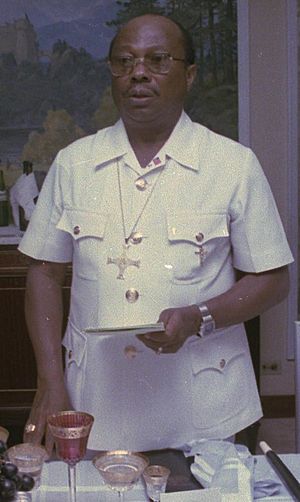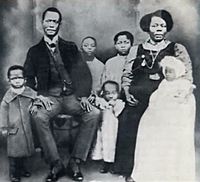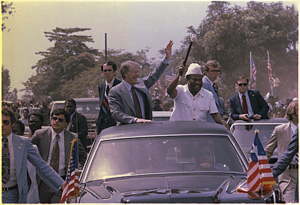William Tolbert facts for kids
Quick facts for kids
William Tolbert
|
|
|---|---|

Tolbert in 1978
|
|
| 20th President of Liberia | |
| In office 23 July 1971 – 12 April 1980 |
|
| Vice President | vacant (1971–1972) James Edward Greene (1972–1977) Bennie Dee Warner (1977–1980) |
| Preceded by | William Tubman |
| Succeeded by | Samuel Doe |
| 23rd Vice President of Liberia | |
| In office 1 January 1952 – 23 July 1971 |
|
| President | William Tubman |
| Preceded by | Clarence Simpson |
| Succeeded by | James Edward Greene |
| Personal details | |
| Born |
William Richard Tolbert Jr.
13 May 1913 Bensonville, Liberia |
| Died | 12 April 1980 (aged 66) Monrovia, Liberia |
| Cause of death | Murder by Firearm |
| Resting place | Palm Grove Cemetery |
| Political party | True Whig |
| Spouse |
Victoria David
(m. 1936) |
| Children | 8 |
William Richard Tolbert Jr. (born May 13, 1913 – died April 12, 1980) was an important politician in Liberia. He served as the 20th president of Liberia from 1971 until 1980.
Tolbert was part of the Americo-Liberian community. This group was made up of descendants of African Americans who had moved to Liberia. Before becoming president, he worked as a civil servant, which means he worked for the government. He was first elected to the House of Representatives in 1943. He belonged to the True Whig Party, which was the only major political party in Liberia at that time.
In 1952, Tolbert became the 23rd vice president of Liberia under President William Tubman. He held this position until Tubman's death in 1971, when he became president. During his early time as president, Tolbert brought in some new ideas and reforms. He also made Liberia a part of the Non-Aligned Movement, meaning it did not take sides with major world powers.
However, Liberia faced growing money problems. There were also increasing tensions between the Americo-Liberians and the native Liberian groups. These issues led to a period of unrest in the country. Tolbert was killed during a military takeover in 1980. This event ended 133 years of Americo-Liberian rule in Liberia.
Contents
Early Life and Family Background
William Richard Tolbert Jr. was born in Bensonville, Liberia. His parents were William Richard Tolbert Sr. and Charlotte Augusta Tolbert. His family, the Tolberts and Hoffs, were Americo-Liberians. They were descendants of African Americans, with the Hoff family originally from Virginia.
William Tolbert Sr.'s father, Daniel Frank Tolbert, was a former American slave from South Carolina. He moved to Liberia in 1878 during a large movement of people called the Liberian exodus. Daniel Frank Tolbert traveled to Liberia on a ship called the Azok. The Tolbert family became one of the largest and most influential Americo-Liberian families in Liberia.
William Jr. went to Bensonville Elementary School and Crummell Hall Episcopalian High School. He later studied at the University of Liberia, earning a degree in 1934. He married Victoria A. David, who was also of Americo-Liberian and Vai descent. They had eight children together.
Tolbert was first elected to the House of Representatives in 1943. He served there until he became Vice President in 1951. He was also a Baptist minister. In 1965, he became the first African to lead the Baptist World Alliance. He was also a member of the Masonic Order of Liberia.
Becoming President of Liberia
Tolbert became president after President William Tubman died in 1971. Many people outside Liberia saw this peaceful change of power as a sign that Liberia was politically stable. This was different from many other African countries at the time, which were experiencing political unrest.
However, Liberia was mostly a one-party state. This meant that the president had a lot of power. The national legislature and courts often followed the president's lead. There were also limits on people's civil liberties, which are their basic rights and freedoms.
New Ideas and Challenges
When Tolbert became president, he started some new, more open policies. He was re-elected in 1975. However, his government was criticized for not fixing the big economic differences between different groups of people. The Americo-Liberians had controlled the country since it became independent. But the majority of the population belonged to various native ethnic groups.
Because Tolbert came from a powerful Americo-Liberian family, some people accused his government of favoring family members in jobs and economic decisions. Tolbert was the second Liberian president to speak an indigenous language, Kpelle. He tried to bring more native Liberians into the government.
This idea caused some unhappiness among Americo-Liberians. They felt that too many "peasants" (a term they used for native Liberians) were being given important roles. At the same time, many native Liberians felt that changes were happening too slowly.
Tolbert did not want to stay in office for as long as his predecessor, Tubman, who had been president for 27 years. Tolbert worked to change the constitution so that a president could only serve for eight years. In 1976, he strongly opposed any attempts to change this rule back. He believed that serving too long was an "evil tradition."
Liberia's Place in the World
Tolbert changed Liberia's foreign policy. Tubman had strongly supported Western countries. Tolbert, however, wanted Liberia to be more politically independent. He started diplomatic relations with countries like the Soviet Union, China, and Cuba. This meant Liberia took a more neutral stance in global politics.
In 1973, during the Yom Kippur War, Tolbert ended Liberia's ties with Israel. He also spoke in favor of the rights of the Palestinian people. However, he continued to support the United States on the Vietnam War, just like President Tubman had. From July 1979 until his death, Tolbert was the chairman of the Organisation of African Unity, an important group for African countries.
Economic Changes and Challenges
Throughout the 1970s, the price of rubber, a key product for Liberia, was low. This put pressure on Liberia's economy. Tolbert introduced a new way of dealing with foreign companies. Companies like Firestone, which had operated for years without government checks, were now audited. They had to pay millions of dollars in unpaid taxes. Old agreements with these companies were renegotiated. New agreements focused on making private companies more accountable to the Liberian government.
In May 1975, Liberia joined the Economic Community of West African States (ECOWAS). This group aimed to create a common market in West Africa. It also wanted to promote economic cooperation and stability among 15 West African countries. The goal was for it to be as successful as the European Common Market.
By the late 1970s, Tolbert became more open to economic help from Libya and Cuba. Libya was about to start building affordable housing in Monrovia. However, this project stopped because of the 1980 coup.
Return of Multiple Political Parties
Liberia had been a one-party state since 1877. But in 1973, the country saw the return of a two-party system. The Progressive Alliance of Liberia, led by Gabriel Baccus Matthews, was officially recognized as an opposition party.
Addressing Crime in Maryland County
During the 1970s, people in Maryland County faced threats from ritual murders. Between November 1976 and July 1977, 14 people disappeared in the county. Tolbert responded by firing the local leader, James Daniel Anderson, for not reporting the missing people. He publicly stated that anyone who deliberately killed someone would face the law. Eventually, twelve suspects were arrested. Seven of them, including four government officials, were found guilty and executed.
The Rice Riots of 1979
In April 1979, Tolbert's agriculture minister, Florence Chenoweth, suggested raising the price of rice. Rice is a very important food in Liberia. The price was to go from $22 to $26 for a 100-pound bag. Chenoweth said this would encourage rice farmers to keep farming instead of moving to cities or rubber plantations for work.
However, political opponents criticized this idea. They pointed out that Chenoweth and the Tolbert family owned large rice farms. They would benefit greatly from the price increase. The Progressive Alliance of Liberia called for a peaceful protest in Monrovia against the proposed price hike.
On April 14, about 2,000 activists started a march towards the presidential palace. The protest grew much larger when over 10,000 other people joined them. The march quickly turned into a riot with widespread looting and destruction. Property damage was estimated at over $40 million. At least 41 protesters were killed by shooting. This event caused more riots and demonstrations across the country in the following year. Tolbert tried to restore order by arresting opposition leaders, but it did not work. The disorder increased, and Tolbert's public trust was severely damaged.
Military Takeover and Death
In March 1980, Tolbert ordered the Progressive Alliance of Liberia to be banned. He had Gabriel Bacchus Matthews and other leaders of the group arrested for treason.
In the early hours of April 12, 1980, 17 soldiers and non-commissioned officers from the Armed Forces of Liberia carried out a violent military takeover. They were led by Master Sergeant Samuel Doe. All of them were native Liberians. They later formed the People's Redemption Council, which became the new ruling group.
The soldiers entered the Presidential palace and killed Tolbert. His body was put into a mass grave with 27 other victims of the coup. A crowd of angry Liberians gathered to shout insults and throw rocks at the bodies. Tolbert's body was later moved to Palm Grove Cemetery in Monrovia, near the bodies of those killed in the Rice Riots.
By the end of April, most of Tolbert's cabinet members were put on trial in quick, unfair hearings. Many were sentenced to death and publicly executed on April 22 at a beach in Monrovia. Only four of Tolbert's cabinet members survived. One of them was the Minister of Finance, who later became president, Ellen Johnson Sirleaf.
How Tolbert Died
It is known that Tolbert died on April 12, 1980, the day of the coup. However, there are different stories about exactly when and how he died.
Steven Ellis, in his book Mask of Anarchy, wrote that the president was found sleeping in his office and killed there by the soldiers. However, Ellen Johnson Sirleaf's biography, This Child Will Be Great, states that Tolbert was captured and killed in his bed.
Family After the Coup
Some of Tolbert's children now live in the United States. His brother, Stephen A. Tolbert, served as his finance minister until he died in a plane crash in 1975. One of Tolbert's sons, A. Benedict Tolbert, was killed after the coup. He had sought safety in the French Embassy, but soldiers from Doe's security force arrested him. They broke rules about diplomatic protection. He was reportedly thrown from a military aircraft while being taken to a prison.
Two of his daughters are no longer alive. Victoria Tolbert Yancy died in 1971. Evelyn Tolbert Richardson died in 1993 in the United States. His wife, former First Lady Victoria Tolbert, died in Minnesota in 1997 at the age of 81. She had moved to the United States after being released from house arrest following the coup. His grandson, Tolbert Williams, currently lives and works in the UK.
See also
 In Spanish: William R. Tolbert para niños
In Spanish: William R. Tolbert para niños
- History of Liberia
- Harrison Pennoh
 | Frances Mary Albrier |
 | Whitney Young |
 | Muhammad Ali |



